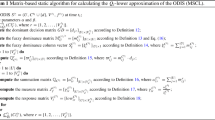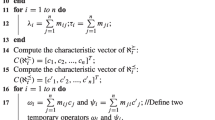Abstract
Dominance-based rough sets approach (DRSA) uses dominance relations to substitute equivalence relations in conventional rough set models so that it can handle preference-ordered information. Up to date, DRSA has been widely used in multi-criteria decision-making problems. In these real-life problems, however, since the collected data are evolving from time to time, there are often some variations of the attribute sets or object sets. In the dynamic information systems, the frequent update of the lower and upper approximations of DRSA is an necessary step for further updating attribute reducts and decision rules which are important for knowledge discovery and decision-making. Incrementally updating approximations is a type of effective methods to reduce the computational load when any variation occurs. Most of current studies on incremental methods only consider conventional rough set models and the situation when a single object varies in an information system. In this paper, we focus on the variations of object sets and discuss incremental methods of updating approximations of DRSA when multiple objects changed. The updating principles in different dynamic situations are given with detail proofs and the corresponding incremental algorithms are also developed. The experimental evaluations on 12 UCI data sets show that our proposed incremental approaches effectively reduce the computational time in comparison with the non-incremental approach as well as a typical incremental method in the literature.


Similar content being viewed by others
Abbreviations
- U :
-
Universe
- \(U^{{\prime }}\) :
-
The updated universe
- X :
-
A target concept (decision class)
- \(X^{{\prime }}\) :
-
The updated decision class
- \([x]_{C}^{ \le } /[x]_{C}^{ \ge }\) :
-
Dominating/dominated set of object x
- \([x]_{C}^{{{\prime } \le }} /[x]_{C}^{{{\prime } \ge }}\) :
-
The updated dominating/dominated set of x
- \(X^{ - }\) :
-
The set of removed objects
- \(X^{ + }\) :
-
The set of inserted objects
- \(\underline{R}_{C}^{ \le } \left( X \right)\) :
-
Lower approximation of X
- \(\underline{R}_{C}^{ \le } (X^{{\prime }} )\) :
-
The updated lower approximation of X
- \(\overline{R}_{C}^{ \le } \left( X \right)\) :
-
Upper approximation of X
- \(\overline{R}_{C}^{ \le } (X^{{\prime }} )\) :
-
The updated upper approximation of X
References
Pawlak Z (1982) Rough Sets. Int J Inf Comput Sci 11(3):289–296
Wang XZ, Aamir R, Fu AM (2015) Fuzziness based sample categorization for classifier performance improvement. J Intell Fuzzy Syst 29:1185–1196
Lu SX, Wang XZ, Zhang GQ, Zhou X (2015) Effective algorithms of the Moore–Penrose inverse matrices for extreme learning machine. Intell Data Anal 19(4):743–760
Wang XZ, Dong CR, Fan TG (2007) Training T–S norm neural networks to refine weights for fuzzy if-then rules. Neurocomputing 70(13–15):2581–2587
Wang XZ, He Q, Chen DG, Yeung DS (2005) A genetic algorithm for solving the inverse problem of support vector machines. Neurocomputing 68:225–238
Wang XZ (2015) Learning from big data with uncertainty—editorial. J Intell Fuzzy Syst 28(5):2329–2330
Wang XZ, Xing HJ, Li Y et al (2015) A study on relationship between generalization abilities and fuzziness of base classifiers in ensemble learning. IEEE Trans Fuzzy Syst 23(5):1638–1654
Wang R, Kwon S, Wang XZ, Jiang QS (2015) Segment based decision tree induction with continuous valued attributes. IEEE Trans Cybern 45(7):1262–1275
Wang XZ, Wang R, Feng HM, Wang HC (2014) A new approach to classifier fusion based on upper integral. IEEE Trans Cybern 44(5):620–635
Wang XZ, Hong JR (1998) On the handling of fuzziness for continuous-valued attributes in decision tree generation. Fuzzy Sets Syst 99(3):283–290
Qian Y, Liang J, Pedrycz W (2011) An efficient accelerator for attribute reduction from incomplete data in rough set framework. Pattern Recogn 44(8):1658–1670
Chen X, Ziarko W (2011) Experiments with rough set approach to face recognition. Int J Intell Syst 26(6):3–21
Blaszczynski J, Greco S, Slowinski R (2012) Inductive discovery of laws using monotonic rules. Eng Appl Artif Intell 25(2):284–294
Abbas A, Liu J (2012) Designing an intelligent recommender system using partial credit model and bayesian rough set. Int Arab J Inf Technol 9(2):179–187
Chang B, Hung H (2010) A study of using RST to create the supplier selection model and decision-making rules. Expert Syst Appl 37(12):8284–8295
Wang XZ, Tsang ECC, Zhao SY, Chen DG, Yeung DS (2007) Learning fuzzy rules from fuzzy samples based on rough set techniques. Inf Sci 177:4493–4514
Wang XZ, Zhai JH, Lu SX (2008) Induction of multiple fuzzy decision trees based on rough set technique. Inf Sci 178(16):3188–3202
Zhao SY, Wang XZ, Chen DG, Tsang ECC (2013) Nested structure in parameterized rough reduction. Inf Sci 248:130–150
Greco S, Matarazzo B, Slowingski R (1999) Rough approximation of a preference relation by dominance relation. Eur J Oper Res 117:63–83
Greco S, Matarazzo B, Slowingski R (2001) Rough sets theory for multicriteria decision analysis. Eur J Oper Res 129(1):1–47
Greco S, Matarazzo B, Slowingski R (2002) Rough approximation by dominance relations. Int J Intell Syst 17(2):153–171
Kotlowski W, Blaszczynski J, Greco S, Slowinski R (2008) Stochastic dominance-based rough set model for ordinal classification. Inf Sci 178(21):4019–4037
Luo G, Yang X (2010) Limited dominance-based rough set model and knowledge reductions in incomplete decision system. J Inf Sci Eng 26:2199–2211
Blaszczynski J, Greco S, Slowinski R (2009) Monotonic variable consistency rough set approaches. Int J Approx Reason 50(7):979–999
Qian YH, Liang JY, Dang CY (2008) Interval ordered information systems. Comput Math Appl 56(8):1994–2009
Qian YH, Dang CY, Liang JY, Tang DW (2009) Set-valued ordered information systems. Inf Sci 179(16):2809–2832
Peters G, Poon S (2011) Analyzing it business values—a dominance-based rough sets approach perspective. Expert Syst Appl 38:11120–11128
Zhang R, Liu B, Liu S (2010) A multi-attribute auction model by dominance-based rough sets approach. Comput Sci Inf Syst 7:843–858
Liou J, Tzeng G (2010) A dominance-based rough set approach to customer behavior in the airline market. Inf Sci 180:2230–2238
Zhang JB, Li TR, Chen HM (2014) Composite rough sets for dynamic data mining. Inf Sci 257:81–100
Zhang JB, Li TR, Ruan D, Liu D (2012) Neighborhood rough sets for dynamic data mining. Int J Intell Syst 27:317–342
Chen HM, Li TR, Ruan D, Lin JH, Hu CX (2013) A rough-set based incremental approach for updating approximations under dynamic maintenance environments. IEEE Trans Knowl Data Eng 25(2):274–284
Hu F, Wang G, Huang H, Wu Y (2005) Incremental attribute reduction based on elementary sets. In: Proceedings of international conference of RSFDGrC, LNAI, vol 3641. Springer, Berlin, pp 185–193
Liang JY, Wang F, Dang CY, Qian YH (2014) A group incremental approach to feature selection applying rough set technique. IEEE Trans Knowl Data Eng 26(2):294–308
Xu Y, Wang L, Zhang R (2011) A dynamic attribute reduction algorithm based on 0–1 integer programming. Knowl-Based Syst 24:1341–1347
Shan N, Ziarko W (1995) Data-based acquisition and incremental modification of classification rules. Comput Intell 11(2):357–370
Bang WC, Zeungnam B (1999) New incremental learning algorithm in the framework of rough set theory. Fuzzy Syst 1(1):25–36
Tong LY, An LP (2002) Incremental learning of decision rules based on rough set theory. In: Proceedings of the fourth world congress on intelligent control and automation, pp. 420-425
Liu X, Qian YH, Liang JY (2014) A rule-extraction framework under multigranulation rough sets. Int J Mach Learn Cybern 5(2):319–326
Ju HR, Yang XB, Song XN, Qi YS (2014) Dynamic updating multigranulation fuzzy rough set: approximations and reducts. Int J Mach Learn Cybern 5(6):981–990
Jia X, Shang L, Chen J (2011) Incremental versus non-incremental: data and algorithms based on ordering relations. Int J Comput Intell Syst 4:112–122
Li SY, Li TR, Liu D (2013) Dynamic maintenance of approximations in dominance-based rough set approach under the variation of the object set. Int J Intell Syst 28(8):729–751
Li Y, Liu XQ, Hou JJ (2014) Incrementally updating method in dominance-based rough set approach. Int J Intell Inf Manag Sci 3(1):18–22
Luo C, Li TR, Chen HM, Liu D (2013) Incremental approaches for updating approximations in set-valued ordered information systems. Knowl-Based Syst 50:218–233
Luo C, Li TR, Chen HM (2014) Dynamic maintenance of approximations in set-valued ordered decision systems under the attribute generalization. Inf Sci 257:210–228
Newman D, Hettich S, Blake C, Merz C (1998) UCI repository of machine learning databases, University of California, Department of Information and Computer Science, Irvine, CA, 1998. http://archive.ics.uci.edu/ml/
Acknowledgment
This work is supported by the National Natural Science Foundations of China (Nos. 61170040,61473111), the Natural Science Foundations of Hebei Province (Nos. F2014201100, A2014201003), and Postgraduate Innovation Foundations of Hebei University (No. X2015059).
Author information
Authors and Affiliations
Corresponding author
Rights and permissions
About this article
Cite this article
Li, Y., Jin, Y. & Sun, X. Incremental method of updating approximations in DRSA under variations of multiple objects. Int. J. Mach. Learn. & Cyber. 9, 295–308 (2018). https://doi.org/10.1007/s13042-015-0477-8
Received:
Accepted:
Published:
Issue Date:
DOI: https://doi.org/10.1007/s13042-015-0477-8




